New York becomes the 6th state to give a green light to human composting
>
New York has become the sixth US state to legalize natural organic reduction, also known as human composting, despite critics disapproving of the burial method, saying “human bodies are not household waste.” “.
Recently re-elected Gov. Kathy Hochul, a Democrat, signed the legislation on Saturday. Washington state became the first state to legalize human composting in 2019, followed by Colorado and Oregon in 2021 and Vermont and California in 2022.
“I am committed to composting my body and my family knows it,” said Howard Fischer, a New York City-based investor. “But I would love it to happen in New York, where I live, instead of traveling across the country.”
For the 63-year-old man, this alternative, eco-friendly method of burial aligns with his philosophical vision of life: living in an environmentally conscious way.
The process consists of the following: the body of the deceased is placed in a reusable container along with plant material such as wood chips, alfalfa, and straw. The organic blend creates the perfect habitat for natural microbes to do their job, quickly and efficiently breaking down the body in about a month.

New York is now the sixth US state to legalize natural organic reduction, also known as human composting. Pictured: The first stage of human composting at the Recompose Center in Seattle, Washington. It involves placing a body on a bed of straw, alfalfa, and wood chips before moving it into the unit (the hexagonal shape).

New York Governor Kathy Hochul on Saturday signed into law a bill approving the new burial method
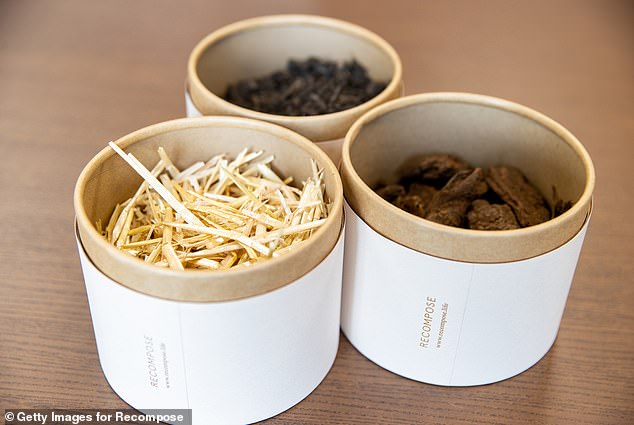
Straw and wood chips (pictured) are used in the human composting process, creating the perfect habitat for natural microbes to break down the human body in about a month.

General view of a variety of compost bins at Recompose in Seattle, an eco-friendly funeral home that specializes in human composting
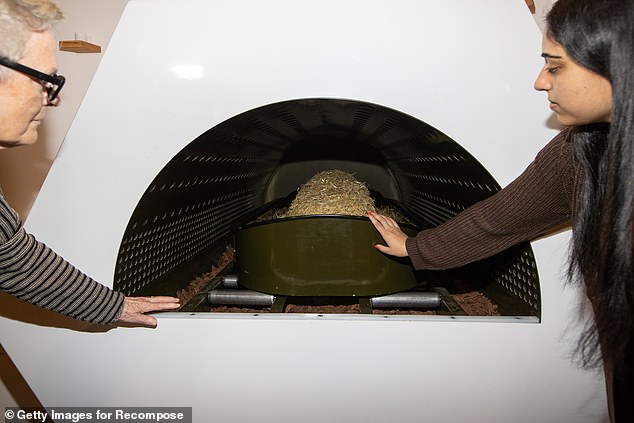
Two people look at a shrouded mannequin inside a boat, where the bodies often lie for a month as they decompose before turning into mulch.
The end result is one heaping cubic yard of nutrient-rich soil amendment, the equivalent of about 36 bags of soil, which can be used to plant trees or enrich conservation lands, forests or gardens.
For urban areas like New York City, where land is limited, it can be seen as quite an attractive burial alternative.
“It’s comforting to think of my body serving nature, flowers and trees instead of being in a box six feet underground or burned,” Bernard O’Brien, 65, who lives in Brooklyn Heights and works with Independent Budget of New York City. Office, he previously told DailyMail.com.
“I was raised as a Christian and… if my body is distributed back to nature, it gives me images of my loved ones enjoying the flowers and trees forever.”
He plans to sign on once it’s approved, then spread his soil over a nature preserve in Indiana, where he’s from.
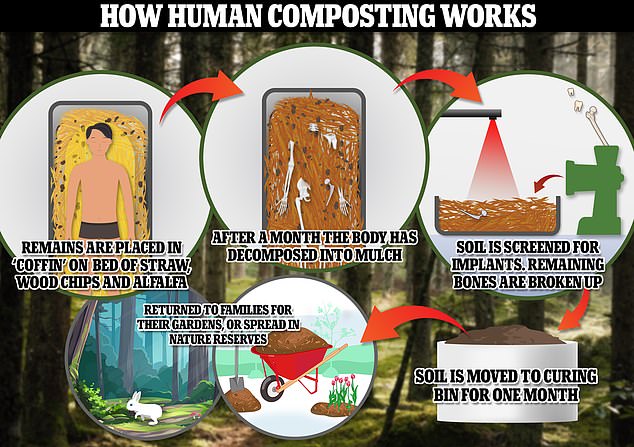
This graphic shows the human composting process, which is already legal in five other states besides New York, including California, Washington, Vermont, Oregon, and Colorado.
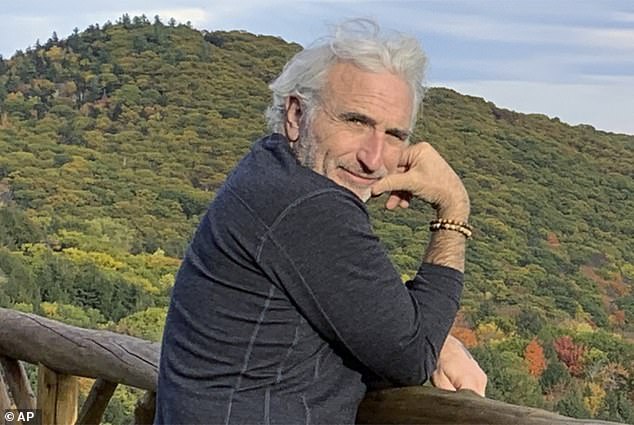
New York City-based investor Howard Fischer, 63, is a supporter who sees human composting as an eco-friendly way to return your remains to the earth as fresh, fertile soil when you die.
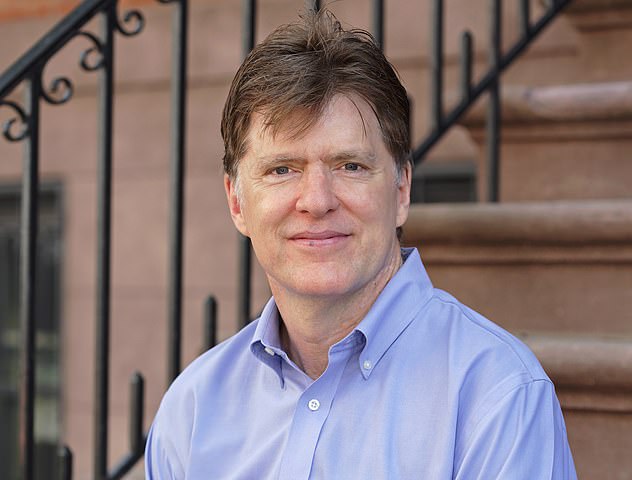
Bernard O’Brien, 65, who lives in Brooklyn Heights, New York, said his body’s natural decomposition process is “comforting” as it allows his remains to revert back to nature.
And like O’Brien, some 200 people have requested their remains to go through the process to date, with another 1,200 currently on the waiting list.
Michelle Menter, manager of Greensprings Natural Cemetery Preserve, a cemetery in central New York, said the facility would “seriously consider” the alternative method.
“It’s definitely more in line with what we do,” he added.
The 130-acre (52-hectare) Nature Reserve Cemetery, nestled among protected forests, offers natural, green burials, which is when a body can be placed in a biodegradable container and in a grave so it can fully decompose.
“Anything we can do to get people away from concrete linings, fancy coffins and embalming, we must do and support,” he said.
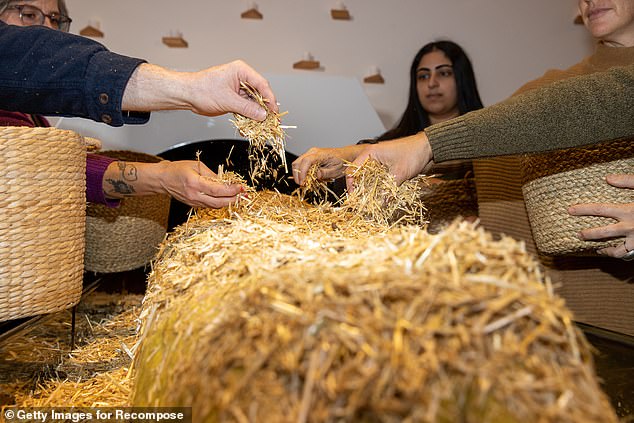
Guests place wood chips and straw in a covered dummy near the ship before leaving the body to decompose for 30-31 days.
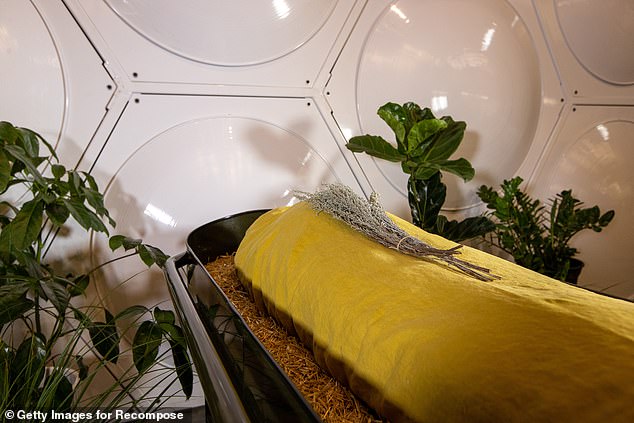
A flower-wrapped mannequin rests near a compost bin that mimics what happens to human corpses before they begin to decompose.
However, not everyone agrees with the idea.
The New York State Catholic Conference, a group that represents bishops in the state, has long opposed the bill, calling the burial method “inappropriate.”
“A process that is perfectly appropriate for returning vegetable trimmings to the ground is not necessarily appropriate for human bodies,” Dennis Poust, the organization’s executive director, said in a statement.
“Human bodies are not household waste and we do not believe the process meets the standard of reverent treatment of our earthly remains,” he said.
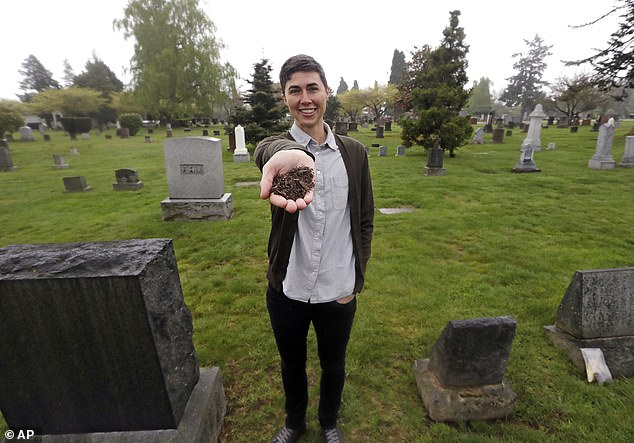
Katrina Spade, founder and CEO of Recompose, shows a sample of compost material left over from a cow’s decomposition, using a combination of wood chips, alfalfa and straw, as she poses in a Seattle cemetery.
Katrina Spade, founder of Recompose, a full-service green funeral home in Seattle that offers human composting, said it offers an alternative for people who want to align the disposal of their remains with how they lived their lives.
He said it “feels like a movement” among environmentalists.
“Cremation uses fossil fuels and burial uses a lot of land and has a carbon footprint,” Spade said. “For many people, becoming land that can be converted to grow into a garden or a tree is quite a shock.”
Four more states, Delaware, Illinois, Massachusetts and Minnesota, are also seeking to legalize human composting. Bills supporting the process failed in Hawaii and Maine.
